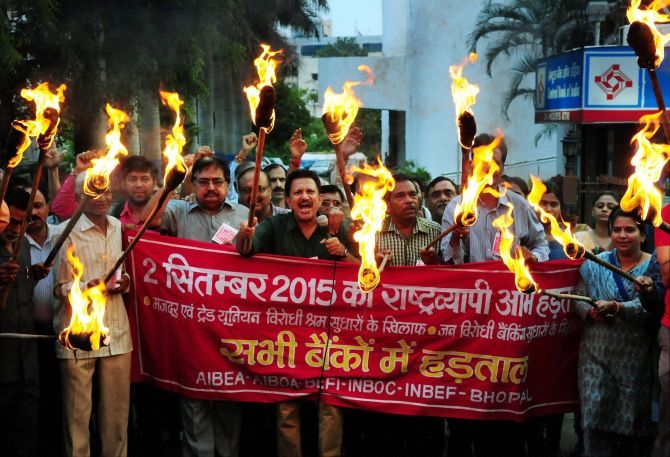On the eve of the Modi government's two years in office, the RSS-linked Bharatiya Mazdoor Sabha leadership met Finance Minister Arun Jaitley.
After the meeting, the BMS claimed the FM told its delegation 'the government has realised that labour reforms are not essential for industrial growth in the country.'
Archis Mohan reports.

The battle on labour reforms between some of the Narendra Modi government's ministers and the Bharatiya Mazdoor Sangh, the trade union arm of the Rashtriya Swayamsevak Sangh, is increasingly reminiscent of the stormy relations between the two sides during the Atal Bihari Vajpayee-led government.
Finance Minister Arun Jaitley has had to withdraw several proposals because of the pressure from unions. Some of these being the rollback of the tax on Employees Provident Fund withdrawals and the rollback of the 0.1 per cent cut in Public Provident Fund interest rates to 8.7 per cent.
The government has also heeded the unions by not increasing the pensionable age from 50 to 55. Recently, the PM and the FM said the labour laws would not be amended without detailed consultations.
In the past few months, the BMS has effectively stalled the labour reforms in Rajasthan by approaching the International Labour Organisation. It has challenged the Rajasthan government's labour reforms under ILO's convention 81, saying the state assembly amended the labour laws without mandatory consultations with labour unions. The BMS has also protested amendments to labour laws in Haryana.
BMS representatives met senior officials of the Prime Minister's Office in May to underline how increased automation has led to jobless growth and the need to focus on labour-intensive Micro, Small and Medium Enterprises, said a Bharatiya Mazdoor Sangh leader.
In 1999, BMS founder Dattopant Thengadi had publicly criticised Vajpayee and opposed reforms. The story seems to be repeating itself a decade-and-a-half later as the BJP-led governments -- at the Centre as well as in the states -- face stiff resistance from the BMS.
On the eve of the Modi government's two years in office, the BMS leadership had met Jaitley. In a press release after the meeting, the BMS claimed that the FM told its delegation 'the government has realised that labour reforms are not essential for industrial growth in the country.'
According to BMS leaders, there were nine participants at that meeting -- four from the BMS and four ministers from the inter-ministerial group on labour, Jaitley, Labour Minister Bandaru Dattatreya, Power Minister Piyush Goyal and Petroleum Minister Dharmendra Pradhan. Labour Secretary Shankar Aggarwal was also present at the meeting.
According to sources, not all in the government were happy with the BMS statement. "There was a sense that the BMS took editorial liberties and should have consulted North Block before releasing the statement," said a source in the government.
However, senior BMS leaders told Business Standard they stand by the statement: "Whoever is sceptical about our press statement needs to only wait for the events to unfold in the months to come," a senior BMS leader said.
Just about a week before the BMS meeting, Jaitley had told Business Standard: "On labour... the emphasis has to be on what is do-able and possible. There is also needs to be on job generation."
"The Indian trade union movement is still to realise that job growth should also be part of the agenda," the finance minister said. "Saving existing jobs is one challenge, but growing is also essential. I still think the union movement is delicately poised on that question."
A few days later, in an interview to The Wall Street Journal, the PM said the labour reforms should not just mean 'in the interest of industry,' but should also be in the interest of the labourer. Modi also said that 'hire and fire' was a Western phrase.
The BMS is galvanised on the issue of labour reforms. In his address at the ILO conference in Geneva on June 1, former BMS president C K Saji Narayanan flagged the issue of transnational corporations operating without respecting uniform labour standards in developing countries and of automation leading to jobless growth.
In India, the BMS and the RSS want the government to focus more on MSMEs to create jobs.
Unions with 66% votes to speak for workers
Currently, there is no law that makes it mandatory for managements to recognise a trade union, says Arindam Majumder.
Soon, managements of companies will have to recognise a trade union that has the support of at least two-thirds or 66 per cent of workers, if the proposed Industrial Relations Code is enacted. Currently, there are no norms for recognising unions.
A union proving the requisite amount of support will also be considered as the representative body of workers to engage in dialogue with the management in case of a dispute.
The revised Bill, containing this provision, has been sent for approval to the law ministry by the labour ministry.
In case no union garners the prescribed majority, the Bill provides for the formation of a collective bargaining council, where different unions will send their representatives.
In such a case, a union gets a seat on the council for every 10 per cent of votes. Unions that do not get at least 10 per cent votes would not be included in the council.
Currently, there is no law that makes it mandatory for managements to recognise a trade union.
Although there is a fundamental right to form unions and a statutory right to get it registered, there is no corresponding legal obligation on the employer to recognise a trade union, whether registered or not, even if they truly are representative.
"Recognition of a trade union is very different from registration. There have been numerous cases before tribunals where the management has refused to recognise a union as the bargaining body of workers. This provision will benefit both employers and workers as this will ensure a smooth dialogue process," said a senior labour ministry official.
According to another ministry official, trade unions had objected to the original proposal of allowing a union that has even a per cent of votes higher than the second largest union as the sole negotiating agent during tripartite negotiations.
For instance, in a situation where one union gets 41 per cent vote and the other 40 per cent, the second largest union with 40 per cent would have become irrelevant.
"They felt that it would have rendered a union with 40 per cent support useless and render smaller unions without bargaining power," the official said.
IN THE WORKS
- In case no single union has a majority, a collective bargaining council will be formed with representation from all unions.
- Trade unions will get one seat on the council for every 10 per cent of votes, if no union has a majority.
- This is to ensure that small trade unions, too, have a say.
- At present, there is no law mandating the recognition of trade unions by managements.
- Labour ministry feels this will help in speedy resolution of industrial disputes.










